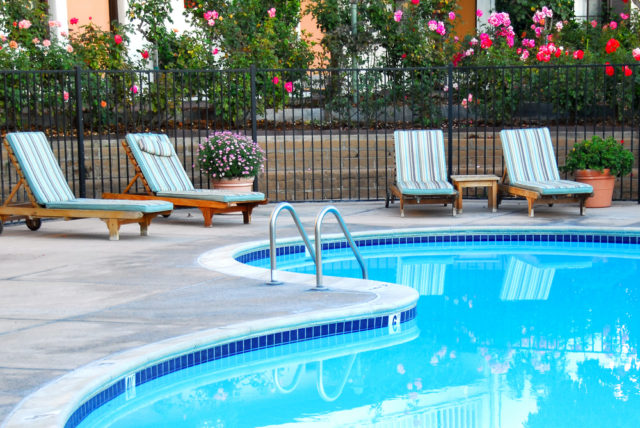Preparing Your Pool for Winter

Hints and tips for winterising (l’hivernage)
Preparing your pool for the winter is an essential task that will keep the pool and equipment in good condition ready for quickly re-opening the pool in the spring. Here is a guide to the procedure that should be followed with a few hints and tips based on experience in the Lot and Quercy region.
Cleaning
1. Thoroughly clean the pool with the suction pipe and brush
2. Make sure the ph level is in the correct range (usually 7.2 to 7.6) and make adjustments, if necessary using ph plus or minus additives
3. Carry out a Chlorine shock treatment using chlorine shock tablets in the dosage recommended by the manufacturer. These should be added to the skimmers and the filtration system left to run for 6-12 hours.
4. Add a proprietary winterising liquid (Produit d’hivernage) – this is a long-life algicide to prevent fungal growth during the winter. Run the filtration system for a further 6-12 hours.
5. Backwash the filter
Water Level
Assuming there are no leaks in your pool, switch your skimmer valve off and drain the water down to just below the bottom of the skimmer. This is to allow for the winter rainfall to bring the level back up otherwise the pool could overflow.
If there is a risk of ice formation, protect the pool sides from damage by floating something on the water surface to absorb expansion. This can be polystyrene or used chemical containers half filled with water. It is a good idea to tether them around the pool because they can all end up in the same place.
Equipment
Once you have circulated your chemicals and drained down the top level it is time to drain the water out of your pump, filter and heater. Each should have a drain plug at the bottom to let the water out. This is so it does not freeze inside it and damage it. Put the drain plugs in the basket of the pre-filter so that you don’t lose them.
Take your summer cover off and give it a thorough clean with fresh water. If possible jet it off with a pressure washer but don’t use too much intensity if your cover is quite old. Either fold it up and pack it away somewhere dry or leave it on the roller but cover it over with a winter storage cover.
Put your winter debris cover on the pool to keep as many leaves out as possible. Always tension it as tight as possible. It should not dangle in the water. You may need to re-tension it after the first two or three days. Remember normal winter covers are not safety covers. Pets and children can still end up in the water if they walk on the cover. If the pool is not fenced a safety winter cover will be required.
Hints and Tips
- When cleaning the pool, take the opportunity to scrub the water line. It is here that oily deposits accumulate – often attributable to bathers with suntan lotion! There are proprietary liquid cleaners available.
- Reducing the level of water in the pool is not necessary if you are able to check the level through the winter and let some water out if required.
- Antifreeze precautions may not be necessary on less exposed situations and especially for salt water pools.
- If the pool equipment is inside, it may not be necessary to drain the system.
- An antifreeze precaution for undrained systems in very cold weather is to run the pump for an hour or so in the early hours of the morning – taking water from the bottom of the pool
- In the early spring, before opening the pool add some more algicide or chlorine as a top-up.
Share to: Facebook Twitter LinkedIn Email
Leave a reply
Your email address will not be published. Required fields are marked *




REPLY
REPLY
REPLY
REPLY
REPLY
REPLY
REPLY